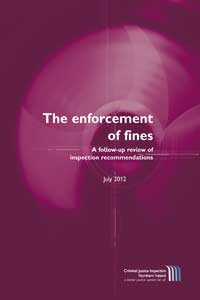
Substantial changes still required on enforcement of fines
Criminal Justice Inspection has today repeated its call for the implementation of a robust and effective enforcement process to be put in place to minimise the inappropriate and expensive use of police and prison resources in dealing with people who default on the terms of a court order.
The Criminal Justice Inspection Northern Ireland report published today, 31 July, ‘The enforcement of fines – a follow-up review of inspection recommendations’, acknowledged the complexity of the issues surrounding the enforcement of fines.
It found, however, that despite work undertaken since its initial report in March 2010, overall progress in reducing the number of people sent to prison solely for fine default has been slow, with new committals to prison for fine default rising to 2,179 in 2011 from 1,247 in 2009.
Acting Chief Inspector Brendan McGuigan said, “Our initial report on the enforcement of fines in Northern Ireland found that there was a need for substantial change to the enforcement process and a stricter regime for the payment of fines to maximise compliance and minimise recourse to police enforcement and imprisonment. Of the 10 recommendations made in the original report, three have been achieved, five partially achieved and two not achieved.”
“While we acknowledge that work that has been undertaken by the justice agencies, and particular the Northern Ireland Courts and Tribunals Service, the statistics relating to the number of warrants issued to police, the number of outstanding warrants and the number of fine defaulters being committed to prison remains significant.
“There have not been the substantive changes required to the enforcement process, nor has there been a stricter regime introduced to maximise compliance and minimise police enforcement and the use of imprisonment. This places tremendous pressures on the prison service at a time when it is undergoing a significant change programme.” said Mr McGuigan.
The follow-up review found that the Northern Ireland Courts and Tribunals Service (NICTS) has made a significant reduction in the number of warrants issued to the police. In addition, the Fine Enforcement Project Group has also been established to take forward fine enforcement in the criminal justice agencies.
The Department has a strategy with a view to introducing new collection powers and a revised enforcement regime in the forthcoming Faster, Fairer Justice Bill. In addition, the introduction of Supervised Activity Orders (SAOs) have the potential to make a positive impact as they are rolled-out across Northern Ireland.
“While we welcome the Department of Justice’s strategic way forward on fine default, this will require legislative change, a new civilian enforcement agency to be constructed, and new processes to be developed; and this will take time for policy development, legislation and implementation.
“Work needs to be urgently taken forward to introduce the stricter regime, as envisaged in the original inspection report, which will produce a system of enforcement which addresses the current issues of public confidence in the justice system, the social and financial cost of short-term sentences for fine defaulters, and the operational impact on the NICTS, the PSNI and in the Northern Ireland prisons,” said Mr McGuigan.